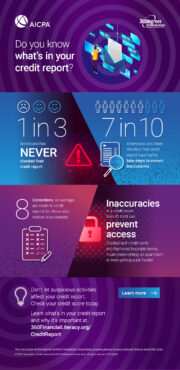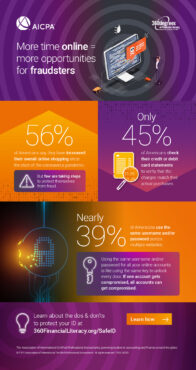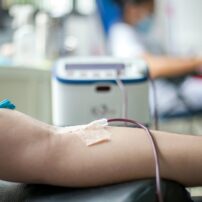 Where do you see yourself in a year? If you’re like most Americans, you might expect to be dealing with the financial fallout of identity theft. Three in five Americans (60 percent) believe it’s likely that identity theft will cause them a financial loss in the next year, according to new research conducted by The Harris Poll on behalf of the American Institute of CPAs (AICPA).
Where do you see yourself in a year? If you’re like most Americans, you might expect to be dealing with the financial fallout of identity theft. Three in five Americans (60 percent) believe it’s likely that identity theft will cause them a financial loss in the next year, according to new research conducted by The Harris Poll on behalf of the American Institute of CPAs (AICPA).
“Law enforcement has reported a big spike in online scams during the COVID-19 pandemic. Taking time to review your bank statements and credit card activity for unauthorized transactions, while also putting safeguards in place like complex passwords, credit card usage alerts and two-factor authentication, can go a long way to mitigate the threat of ID theft,” says Gregory J. Anton, CPA, CGMA, chairman of the AICPA’s National CPA Financial Literacy Commission. “Safe steps also include exercising caution when reading emails and clicking on links, learning about the latest scams, and being mindful of your online presence.”

Online Shopping Increases but Few Take Steps to Protect Themselves
More than half of the 2,116 surveyed Americans (56 percent) say they have increased their overall online shopping since the start of the pandemic. While convenient, online shopping is not without a risk. Fraudsters can gain access to private website data such as your personal information and financial details that can be used to make unauthorized purchases, or even open new accounts exploiting your identity.
The survey also found that since the start of the pandemic, more than a third of American online shoppers have stored logins, passwords or credit/debit card information on websites or apps, while only 28 percent have set up alerts on their credit or debit card for when a purchase is made without their card being present.
These stats may be why in the past year one in five Americans have suffered identity theft or attempted identity theft. These incidents can be quite costly, as Americans lost a total of $16.9 billion in 2019 to identity fraud, according to Javelin Strategy & Research.
While basic steps can help prevent being victimized by fraud, few shoppers are taking them. The survey found that less than half of Americans (45 percent) have checked their credit or debit card statements to ensure that the charges match their actual purchases since the pandemic began. Further, nearly 2 in 5 admit they use the same username or password across multiple websites.
“Using the same username and/or password across multiple websites is like using a master key for every locked door in your life. If just one online account becomes compromised, scammers will have the keys to the information behind every password protected account,” said Kim Hardy, CPA/CFF, member of the AICPA’s National CPA Financial Literacy Commission. “The surge in online activity as people are spending more time at home during COVID has presented bad actors even more opportunities to steal identities. In this environment, it’s essential that Americans are defending their personal information from fraudulent threats.”

Tips for Protect Your Identity
Hardy, who has years of experience in forensic accounting, suggests online shoppers take the following four steps:
Don’t wait for suspicious activity to occur. Take time to check your credit score for free at least once a year with one of the three major credit reporting agencies. And if you find that you’ve been the victim of identity theft, report it immediately to the Federal Trade Commission, your local police department and the credit reporting agencies.
Do your online shopping at home where you know both the device and the network are secure. On-the-go online shopping, though convenient, puts your personal information at risk. You have no control over who might also be using that unsecured public network.
Check to make sure the shopping websites you visit are secure. The URL, also known as a web address, will indicate if a website is secure. Look for a website address that begins with “https://” in lieu of “http://” that’s missing the ‘s.’ If you shop on an unsecured website, scammers can steal your personal and financial information from any forms you fill out.
Be cautious of any unsolicited communications concerning COVID-19 that ask for your personal information. The Federal Trade Commission keeps an updated list of commons scams on it website.”
If you’d like to learn more about the steps you can take to help protect yourself from ID theft, go to 360FinancialLiteracy.org/SafeID.





























